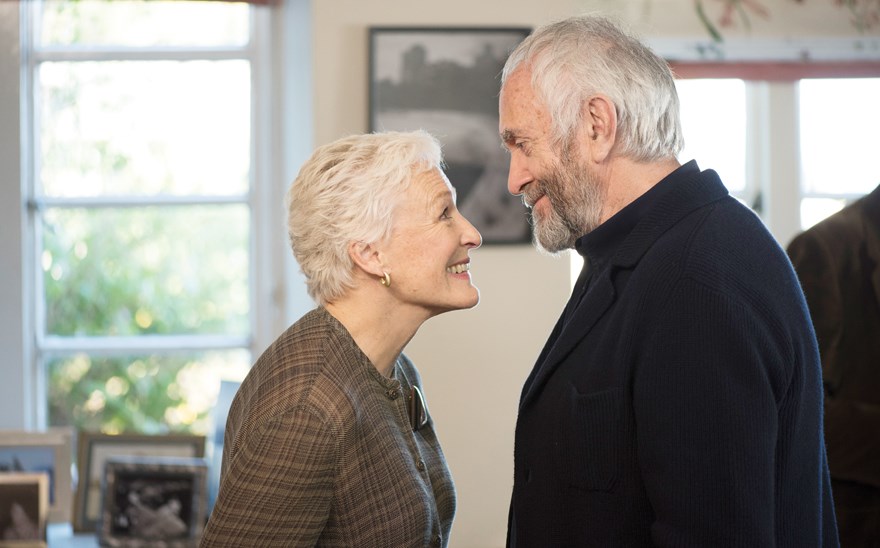The Wife. Directed by Bjorn L. Runge. Starring Glenn Close and Jonathan Pryce. Rating: 8 (out of 10)
Glenn Close has been nominated six times for acting Academy Awards, but has never won. Her portrayal of a long-suffering spouse in The Wife reminds us that she’s long overdue.
Bjorn L. Runge directs Close, working from Meg Wolitzer’s 2003 book about a woman who reflects on her marriage and her own stifled ambition as her husband prepares to accept the Nobel Prize for Literature. The film hinges on Close’s singular ability to transmit huge emotions without hysteria, and occasionally utilizing nothing more than a sad, then simmering, then raging stare.
When Joseph Castleman (Jonathan Pryce) gets the early-morning call from the nomination committee, he asks them to wait until his wife Joan (Close) can get on the extension before receiving the news. Then they celebrate like children, bouncing on the bed. At cocktail parties and in interviews Joe is overly solicitous in the praise of his wife’s role in shaping his career. For her part, Joan takes the news in her stride, more concerned with keeping her husband on track with his medications and his diet than in dwelling on his literary glory.
It’s 1992, and the news is so big that Joseph bumps Bill Clinton off the cover of the New York Times Sunday magazine. The couple heads to Sweden, where they are fawned over by members of the Nobel foundation and a hierarchy makes itself immediately known. Mr. Castleman will be very busy, Joan is told: perhaps they could arrange some shopping excursions for her?
Accompanying the Castlemans is their grown son, David (Max Irons), also a writer, and perpetually living in the shadow of “the greatest living writer of the 20th century.” (A very pregnant daughter stays behind in the States.) Joe dismisses David’s latest work as a cliché, unaware that the story is built on his parents’ truth.
There’s a writer in town for the ceremony, Nathaniel Bone (Christian Slater), who is angling to write a biography of the lauded author. Over a liquid lunch with Joan, Nathaniel probes and offers a theory about why she hasn’t left Joe, particularly given his appetite for extramarital pursuits. “Please don’t paint me as a victim,” says Joan, “I’m much more interesting than that.”
We see the beginning of their relationship, when Joe was a married professor at Smith college and Joan was a brilliant aspiring writer and a smitten student. (Played by Harry Lloyd and Close’s real-life daughter Annie Starke.) We slowly fill in the gaps from then until now: the currency of female writers in a sexist era, the control Joe exerted over his wife for all these years, and how Joan morphed into the self-proclaimed “king-maker” she became.
“There’s nothing more dangerous than a writer whose feelings have been hurt,” says Joan, but clearly hell hath no fury like a woman who has finally had enough. And a marriage held together by the thinnest of threads threatens to unravel completely before the couple checks out of their Stockholm hotel.
Pryce excels as the petulant, condescending man-child who is hailed as a genius, but this is all Close. She’s no scorned stereotype: thanks to the writers for creating a realistic, complex portrait of a long marriage, one in which there can be vitriol for long stretches of time, but peppered with just enough joy to oblige staying together. And only Close could turn on a dime between motherly, resentful, flattered and wounded so convincingly.
The Wife is one well-executed example of the proverbial woman behind the man, and what it cost her to stay put.



